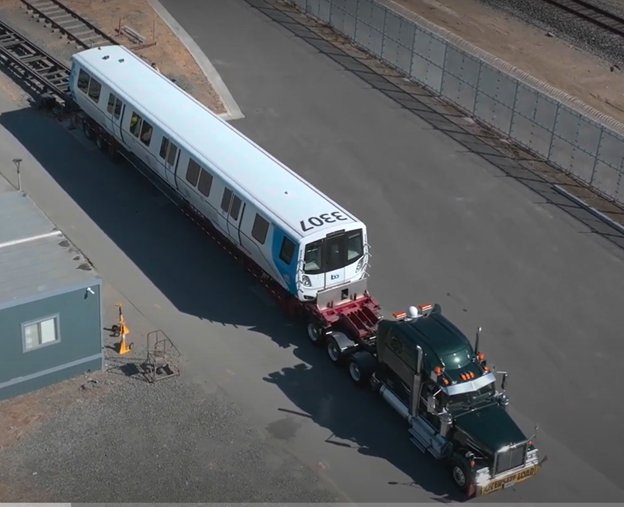Final car of the original Fleet of the Future contract now ready for service

BART’s popular Fleet of the Future project has just completed one milestone, with the final car of the original contract now ready for service. The project is now entering its second phase. The last car of the original contract, car number 775, was officially certified for passenger service on Thursday, July 18th. Without missing a step, BART is now accepting cars from the second Core Capacity contract at the Hayward Test Track.
“It’s remarkable how much the new cars have changed the look and feel of BART for the better,” said BART President Bevan Dufty. “These cars are delivering on the promise of being more reliable, more modern and easier to enter and exit.”
In the six years since the first Fleet of the Future train first went into service, the new trains have gone from a surprising sight for riders to an everyday part of their trip. The legacy fleet was officially retired in April with a fond send off, but the fact is the new trains took over the system by replacing the old cars for all scheduled runs in September 2023.
The increased pace in production and delivery of the new fleet has been essential to the transition. Car manufacturer Alstom is now delivering 20 cars a month to BART, almost twice as many as the 11 cars a month stipulated in the original delivery schedule.
The quicker tempo of deliveries is one of the reasons the Fleet of the Future project is expected to come $394 million under budget. Another big cost saver was BART’s decision to have its own highly experienced staff do more of the engineering work in house. The project team, led by John Garnham, has included engineers who have successfully completed new rail car projects at other agencies.
With all 775 of the cars from the original contract now on board, BART is renewing its focus on the delivery and certification of an additional 306 rail cars for the Transbay Corridor Core Capacity Program (CCP). That’s a package of strategic investments that will allow BART to operate up to 30 ten-car trains per hour in each direction through the Transbay Tube.
An additional 48 cars, which will follow the 306 CCP cars, will serve Phase II of BART to Silicon Valley (BSVII) in the coming decades. The CCP cars and BSVII cars will bring BART’s total fleet to 1,129 rail cars.
“Getting to this transition point has been a true team effort,” said BART General Manager Bob Powers. “We’ve not only worked closely with the car maker to ensure the quality and reliability of the new cars, but we’ve created partnerships to make sure we have the funding to pay for these important investments.”
In addition to BART funds in the 775 Rail Car Project, many funding partners have made the Project possible, including:
- Federal Transit Administration (FTA)
- Metropolitan Transportation Commission (MTC)
- High Speed Rail Authority
- Strategic Growth Council/California Dept of Housing & Community Development
- California Department of Transportation (Caltrans)
- Santa Clara Valley Transportation Authority (VTA)
The Core Capacity (306) Rail Car Project is likewise supported by a coalition of funding partners, including:
- FTA
- MTC
- California State Transportation Agency (CalSTA)
- Caltrans
- San Francisco County Transportation Authority
- Alameda County Transportation Commission
The 48 BSVII rail cars are fully funded by VTA.
BART appreciates the support of all our funding partners in these regionally significant projects.